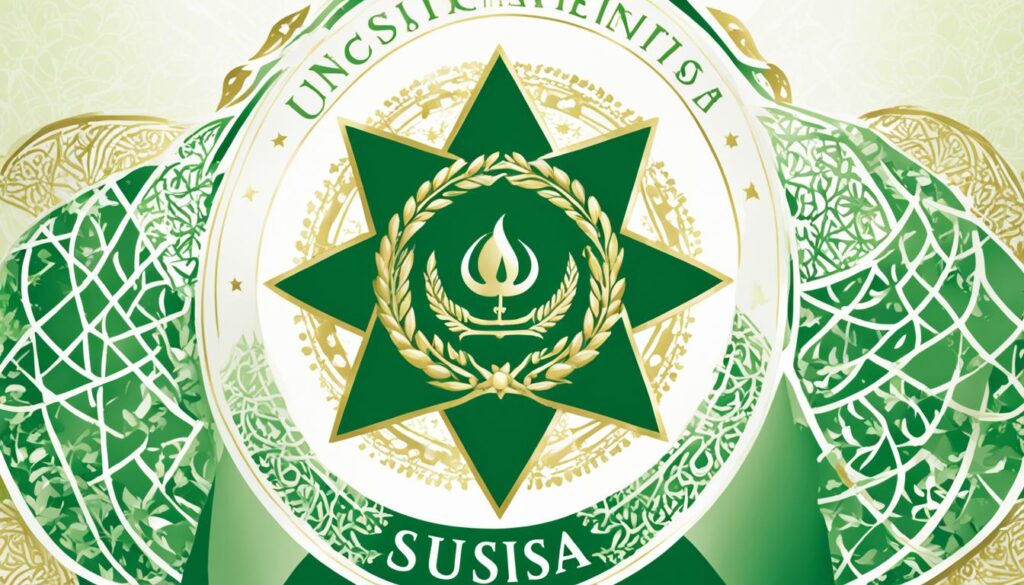Did you know that the global Islamic finance industry is projected to exceed $3.8 trillion by 2023? This rapidly growing sector presents a unique opportunity for aspiring finance professionals to specialize in Sharia-compliant banking and investment practices. One of the premier destinations to pursue an Islamic Finance Master’s degree is Brunei, a country that has embraced this ethical financial system as a core part of its economic development strategy.
Key Takeaways
- Brunei offers a specialized Master’s program in Islamic Finance at the Sultan Sharif Ali Islamic University.
- The program integrates the principles of Islamic finance with contemporary business management, preparing students for diverse roles in the industry.
- Brunei’s strategic location in the BIMP-EAGA region provides access to the growing Islamic finance markets of Southeast Asia.
- Graduates can expect to develop expertise in Sharia-compliant banking, Takaful insurance, and Islamic capital markets.
- The program’s focus on ethical finance aligns with the increasing global demand for socially responsible investments and Halal financial products.
Discover the World of Islamic Finance in Brunei
Brunei, a captivating nation in Southeast Asia, has emerged as a hub for Islamic finance. At the heart of this vibrant ecosystem lies the Sultan Sharif Ali Islamic University (UNISSA), a leading institution committed to cultivating expertise in Sharia-compliant banking and finance.
Explore the Principles and Practices of Sharia-Compliant Banking
UNISSA’s programs in Islamic finance offer students a comprehensive understanding of the guiding principles and real-world applications of Sharia-compliant banking. Through rigorous coursework and hands-on learning, students delve into the intricacies of Islamic finance, exploring concepts such as profit-loss sharing, asset-backed financing, and ethical investment strategies.
Learn from Industry Experts in the Heart of Bandar Seri Begawan
Nestled in the vibrant city of Bandar Seri Begawan, UNISSA provides students with the unique opportunity to learn from industry experts who are at the forefront of the Islamic finance sector. Leveraging Brunei’s strategic location, the university facilitates engaging interactions with financial institutions, regulatory bodies, and leading professionals, allowing students to gain invaluable insights and real-world exposure.
Why Choose an Islamic Finance Master’s in Brunei?
Pursuing an Islamic finance master’s program in Brunei offers a unique opportunity for students aspiring to thrive in the global Islamic finance industry. Graduates of this program possess a distinctive skill set that combines finance expertise with ethical principles, making them stand out in the competitive job market.
Gain a Competitive Edge in the Global Islamic Finance Industry
The Islamic finance master’s program in Brunei equips students with the comprehensive knowledge and practical skills necessary to succeed in the rapidly growing field of Sharia-compliant finance. As the global Islamic finance industry continues to witness substantial growth, Brunei’s program provides students with a solid foundation in areas such as Islamic banking, takaful (Islamic insurance), and Islamic capital markets, preparing them for diverse roles in the industry.
Benefit from Brunei’s Strategic Location in the BIMP-EAGA Region
Brunei’s strategic location within the BIMP-EAGA (Brunei-Indonesia-Malaysia-Philippines East ASEAN Growth Area) region offers students valuable opportunities to network, collaborate, and explore career prospects in the broader Islamic finance landscape. This strategic positioning allows students to gain exposure to the dynamic Islamic finance ecosystem in Southeast Asia, opening doors to a wealth of professional opportunities within the region.
By choosing an Islamic finance master’s program in Brunei, students can unlock a competitive edge, positioning themselves as ethical leaders in the global Islamic finance industry while benefiting from the country’s strategic location in the BIMP-EAGA region.

Brunei: Islamic finance master’s Bandar Seri Begawan Brunei
Nestled in the heart of Southeast Asia, Brunei Darussalam is a nation renowned for its commitment to Islamic finance. The capital city, Bandar Seri Begawan, is home to the prestigious Sultan Sharif Ali Islamic University (UNISSA), which offers a comprehensive Master’s in Islamic Banking and Finance. This program provides students with a unique opportunity to immerse themselves in the principles and practices of Sharia-compliant banking and investments.
Brunei’s strategic location, coupled with its thriving Islamic finance industry, creates an ideal environment for aspiring professionals to hone their skills and knowledge. The Master’s program at UNISSA equips students with a deep understanding of Sharia-based financial instruments, risk management, and the regulatory framework governing Islamic banking and finance.
Through a blend of theoretical and practical coursework, students gain the expertise necessary to navigate the dynamic and ever-evolving world of Islamic finance. From Islamic banking and takaful (Islamic insurance) to Islamic capital markets, the curriculum covers a wide range of topics that are essential for success in this specialized field.
Brunei’s commitment to Islamic finance extends beyond the academic realm, as the country actively promotes Sharia-compliant investments and financial products. This ensures that students enrolled in the Master’s program at UNISSA have ample opportunities to apply their knowledge and gain firsthand experience in the industry.
Program Overview: Master’s in Islamic Finance
The Master of Islamic Banking and Finance program at the Universiti Islam Sultan Sharif Ali (UNISSA) in Brunei offers a comprehensive curriculum that delves into the intricacies of Sharia-compliant finance. This program equips students with a deep understanding of Islamic banking, Takaful (Islamic insurance), and Islamic capital markets, preparing them for success in the dynamic world of Islamic finance.
Comprehensive Curriculum Covering Islamic Banking, Takaful, and Capital Markets
The Master’s in Islamic Finance curriculum at UNISSA covers a wide range of subjects, including the principles of Islamic banking, Takaful, and Islamic capital markets. Students explore the fundamentals of Sharia compliance, learn about Islamic contracts, and gain insights into the structuring of Islamic financial products. The program seamlessly blends theoretical knowledge with practical applications, empowering graduates to thrive in the rapidly evolving Islamic finance industry.
Throughout the program, students engage with industry experts, participate in case studies, and gain hands-on experience in applying the concepts of Islamic finance. This comprehensive approach ensures that UNISSA graduates are well-equipped to navigate the complexities of the Islamic banking, Takaful, and capital markets sectors, positioning them as highly sought-after professionals in the global Islamic finance landscape.
Admission Requirements and Application Process
Aspiring students interested in pursuing a Master’s in Islamic Finance at the Universiti Islam Sultan Sharif Ali (UNISSA) in Brunei must meet specific admission requirements. To be eligible, applicants need to have a minimum CGPA of 2.50 or demonstrate at least 5 years of relevant work experience. International candidates must also obtain a minimum IELTS score of 6.0 or its equivalent to showcase their proficiency in the English language.
The application process for the Islamic finance master’s program at UNISSA involves submitting a comprehensive package of required documents. This includes official transcripts, a well-crafted statement of purpose, and any relevant certificates or credentials highlighting the applicant’s work experience. The university’s admissions team carefully evaluates each application to ensure that the candidate’s qualifications and aspirations align with the program’s objectives.
By meeting the admission requirements and navigating the application process successfully, aspiring students can embark on an enriching academic journey at UNISSA, equipping themselves with the essential knowledge and skills to excel in the dynamic field of Islamic finance.
Student Life: Immerse Yourself in Brunei’s Vibrant Culture
Studying in Brunei presents a unique opportunity for students to immerse themselves in a captivating blend of tradition and modernity. As a nation known for its well-preserved natural environment, rich cultural heritage, and progressive policies, Brunei offers a dynamic and engaging student experience.
Experience the Unique Blend of Tradition and Modernity
Brunei’s student life is characterized by a seamless integration of time-honored Islamic practices and contemporary developments. Whether you’re exploring the serene waterways of the Kampong Ayer floating village, marveling at the grandeur of the stunning Sultan Omar Ali Saifuddien Mosque, or experiencing the vibrant hustle and bustle of Bandar Seri Begawan, you’ll be captivated by the country’s unique ability to preserve its cultural identity while embracing progress.

As a student in Brunei, you’ll have the opportunity to delve into the rich cultural tapestry of the country, learning about its history, traditions, and the role of Islam in shaping its societal norms. From participating in local festivals and customs to engaging with your peers from diverse backgrounds, your time in Brunei will broaden your perspectives and enrich your personal and academic growth.
Facilities and Resources: State-of-the-Art Learning Environment
At the heart of UNISSA, the Sultan Sharif Ali Islamic University, lies a captivating learning environment that seamlessly blends tradition and innovation. This premier institution is committed to providing students with access to cutting-edge facilities and resources, ensuring they thrive in their academic pursuits.
UNISSA’s campus boasts state-of-the-art classrooms, equipped with the latest technological advancements. Students can engage in interactive discussions, access digital libraries, and collaborate on projects using the university’s advanced multimedia capabilities. The well-stocked libraries offer a vast collection of books, journals, and electronic resources, catering to the diverse needs of the Islamic finance curriculum.
Beyond the classroom, UNISSA’s learning environment extends to include modern research laboratories, simulation centers, and specialized computer labs. These facilities enable students to gain hands-on experience, applying theoretical concepts to real-world scenarios and honing their skills in the field of Islamic finance.
The university’s commitment to integrating technology and innovation is evident in its adoption of cutting-edge platforms and software. Students can explore the latest developments in Islamic banking, Takaful, and capital markets through interactive simulations and specialized software, preparing them for the dynamic landscape of the industry.
UNISSA’s state-of-the-art learning environment, coupled with its dedicated faculty and comprehensive curriculum, creates an exceptional platform for students to thrive in their pursuit of excellence in Islamic finance. This holistic approach ensures that graduates are equipped with the knowledge, skills, and practical experience to navigate the evolving landscape of the global Islamic finance industry.
Career Prospects: Unlocking Opportunities in Islamic Finance
Graduates of the Master of Islamic Banking and Finance program are poised to embark on diverse career paths within the thriving Islamic finance industry. With a solid foundation in Sharia-compliant practices and a deep understanding of the principles governing this dynamic field, students are well-equipped to excel in a range of roles, from Sharia advisors and risk analysts to investment bankers specializing in Islamic finance.
The program’s focus on blending theoretical knowledge with practical applications prepares students to contribute to the growth and development of the global Islamic finance industry. Graduates can leverage their expertise to navigate the complexities of banking, asset management, and consultancy, catering to the ever-evolving needs of Sharia-conscious investors and institutions.
Prepare for Diverse Roles in Banking, Investment, and Consultancy
The Master of Islamic Banking and Finance program equips students with the skills and knowledge to thrive in a variety of positions within the Islamic finance sector. From serving as Sharia advisors, ensuring the compliance of financial products and services, to becoming risk analysts assessing the unique risks associated with Sharia-based investments, graduates can make a significant impact.
Furthermore, the program’s emphasis on Islamic capital markets and investment strategies prepares students to excel as investment bankers, managing Sharia-compliant portfolios and structuring innovative financial instruments. The versatility of the curriculum also allows graduates to pursue consultancy roles, advising organizations on the integration of Islamic finance principles into their operations.

Scholarships and Financial Aid: Making Education Accessible
At the University of Brunei Darussalam (UNISSA), we understand the financial challenges that students may face when pursuing higher education. That’s why we’re proud to offer a range of scholarship and financial aid opportunities to make the Master of Islamic Banking and Finance program more accessible to aspiring scholars.
Our UNISSA scholarships are designed to support students in their academic and professional pursuits, ensuring that financial considerations do not hinder their access to high-quality Islamic finance education. These initiatives include merit-based scholarships, need-based financial aid, and various other funding sources.
Whether you’re a local or international student, we encourage you to explore the diverse financial aid options available at UNISSA. Our dedicated team is here to guide you through the application process and help you find the right support to make your educational goals a reality.
By investing in the next generation of Islamic finance professionals, we aim to cultivate a thriving and sustainable industry that positively impacts communities around the world. Take the first step towards your Islamic finance master’s degree and unlock a world of opportunities with the help of our scholarship and financial aid programs.
Accreditation and Recognition: A Trusted Pathway to Success
At the heart of Brunei’s Islamic finance education ecosystem lies the Sultan Sharif Ali Islamic University (UNISSA), a reputable institution renowned for its excellence in the field. UNISSA’s Master of Islamic Banking and Finance program is not only accredited but also widely recognized by relevant authorities, ensuring that graduates receive a degree that is highly valued and respected within the industry.
This accreditation and recognition serve as a trusted pathway to success for students aspiring to excel in the dynamic world of Islamic finance. By choosing to study at UNISSA, you can be confident that your education will be backed by the university’s commitment to academic rigor and industry-relevant curriculum.

The accreditation of UNISSA’s Islamic finance programs is a testament to the university’s dedication to providing its students with a world-class education. This recognition from esteemed bodies validates the quality of the curriculum, the expertise of the faculty, and the university’s commitment to equipping students with the knowledge and skills needed to thrive in the Islamic finance industry.
By choosing to pursue your Master’s in Islamic Finance at UNISSA, you can be assured that your degree will be highly valued and recognized, opening up a world of opportunities both locally and globally. This trusted pathway to success empowers you to confidently embark on your journey towards a rewarding career in the dynamic and rapidly evolving field of Islamic finance.
Continuing Professional Development: Staying Ahead in the Field
Maintaining a competitive edge in the dynamic field of Islamic finance requires a commitment to continuous learning and professional development. The Sultan Sharif Ali Islamic University (UNISSA) recognizes the importance of supporting its graduates in their ongoing career growth. Through various continuing education programs, workshops, and industry collaborations, UNISSA ensures that its alumni have access to the latest knowledge, skills, and networking opportunities to stay ahead in the rapidly evolving Islamic finance landscape.
UNISSA’s commitment to lifelong learning is a crucial aspect of its mission to prepare students for success in the world of Islamic finance. By offering a range of continuing professional development opportunities, the university helps its graduates maintain their industry expertise and stay at the forefront of industry trends and best practices. This commitment to ongoing education is a testament to UNISSA’s dedication to fostering a culture of continuous improvement and innovation within the Islamic finance field.
Whether it’s attending specialized workshops, participating in industry conferences, or engaging in research and consulting projects, UNISSA’s alumni have access to a wealth of resources to enhance their professional development. This approach not only benefits the individual graduates but also contributes to the overall growth and advancement of the Islamic finance industry, as these highly skilled professionals apply their expertise to drive innovation and excellence.
By prioritizing continuing professional development, UNISSA ensures that its graduates are well-equipped to navigate the ever-evolving landscape of Islamic finance. This commitment to lifelong learning not only strengthens the individual’s career prospects but also contributes to the long-term success and competitiveness of the industry as a whole.
Conclusion
The Master of Islamic Banking and Finance program at the Sultan Sharif Ali Islamic University (UNISSA) in Brunei’s capital, Bandar Seri Begawan, offers a remarkable opportunity for individuals seeking to excel in the dynamic field of Islamic finance. By blending a comprehensive curriculum, state-of-the-art facilities, and industry-experienced faculty, UNISSA equips students with the knowledge, skills, and ethical foundation required to thrive in the global Islamic finance industry.
Brunei’s strategic location and its unwavering commitment to Sharia-compliant banking further enhance the appeal of this program, making it an attractive choice for aspiring finance professionals who aim to make a lasting impact in the rapidly evolving world of Islamic finance. Graduates of the UNISSA Islamic finance master’s program will be well-poised to unlock a wealth of career opportunities in banking, investment, and consultancy, contributing to the growth and global influence of the Islamic finance sector.
Whether you are seeking to deepen your expertise, broaden your horizons, or embark on a rewarding career in Islamic finance, the UNISSA Master of Islamic Banking and Finance program in Brunei offers a transformative educational experience that will empower you to excel and make a meaningful difference in this dynamic and rapidly advancing field.
Source Links
- Universiti Islam Sultan Sharif Ali – https://inspirebn.wordpress.com/pi-unissa/
- MSc Finance and Investment in Berlin, Germany | BSBI – https://www.berlinsbi.com/programmes/postgraduate/msc-finance-investment
- MAHSA University – https://mahsa.edu.my/faculties/faculty-of-business-accounting-finance-law-&-humanity/master-of-business-administration-islamic-finance.php


